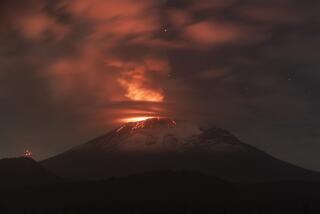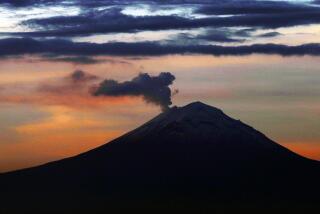VolcanoesMexico’s famed Popocatepetl volcano produced another eruption...
- Share via
Volcanoes
Mexico’s famed Popocatepetl volcano produced another eruption of black ash and steam on the out-skirts of Mexico City. Several tons of ash blew westward, falling near the towns of Amecameca and Ozumba and on rural areas in the state of Morelos. Nearby residents were placed on alert in case the mountain’s activity became more intense.
Surface tremors on Java’s Mt. Merapi volcano increased, prompting officials to post a high- level warning status for villagers in the surrounding area. Volcanologists say that the more than 400 shallow tremors during a two- day period were caused by magma rising toward the surface of Merapi.
Earthquakes
Leading scientists and environmentalist urged the Portuguese government to abandon a plan to simulate an earthquake by detonating 20 tons of explosives under the sea sometime before mid-November. Code-named “Operation Combo,” the project is part of an international experiment to monitor seismic impact. Citizens in the northern coastal area where the blast would occur fear it could trigger a real earthquake or kill marine life.
Earth movements were felt in Japan’s Izu Island chain, eastern and northeastern Japan, theKuril Islands, the eastern Yukon Territory and the Pyrenees.
Tropical Storms
Four children were killed and at least 100 other people injured when tropical cyclone 34W arrived in southern Bangladesh from the Gulf of Thailand. One official in Chittagong told reporters that thousands of cattle were washed away by flash floods.
Killer Algae
The deadly alga Caulerpa taxiflia, accidently introduced into the Mediterranean Sea in 1984, is spreading rapidly from Spain to Croatia. The alga is deadly to marine fauna and appears to be the product of genetic mutation brought about by the use of ultraviolet lights in aquariums. I was first observed in the waters off Monaco’s Oceanographic Museum. Efforts to control the spread of Caulerpa taxifolia are shifting from costly manual and mechanical means to the introduction of slugs that feed on the killer weed.
Drought
Approximately 160,000 people are facing famine in northern Sudan because of a two-year drought, according to the International Red Cross and Red Crescent. The groups have launched an appeal for $3.25 million to help the Beja people, who are already suffering from serious malnutrition.
Solar Connection
Mariners were warned that high-frequency emergency radio channels may not work properly during the next few months because of the current low point in the sun’s 11-year cycle. During this lull, the Earth’s ionosphere becomes less reflective of radio signals. Tim Nicol, manager of New Zealand’s Maritime Safety Authority, recommends that those at sea install radios with a broader band range in order to contact authorities during an emergency. Additional sources: U.S Climate Analysis Center, U.S. Earthquake Information Center and the World Meteorolgical Organization.
More to Read
Sign up for Essential California
The most important California stories and recommendations in your inbox every morning.
You may occasionally receive promotional content from the Los Angeles Times.













